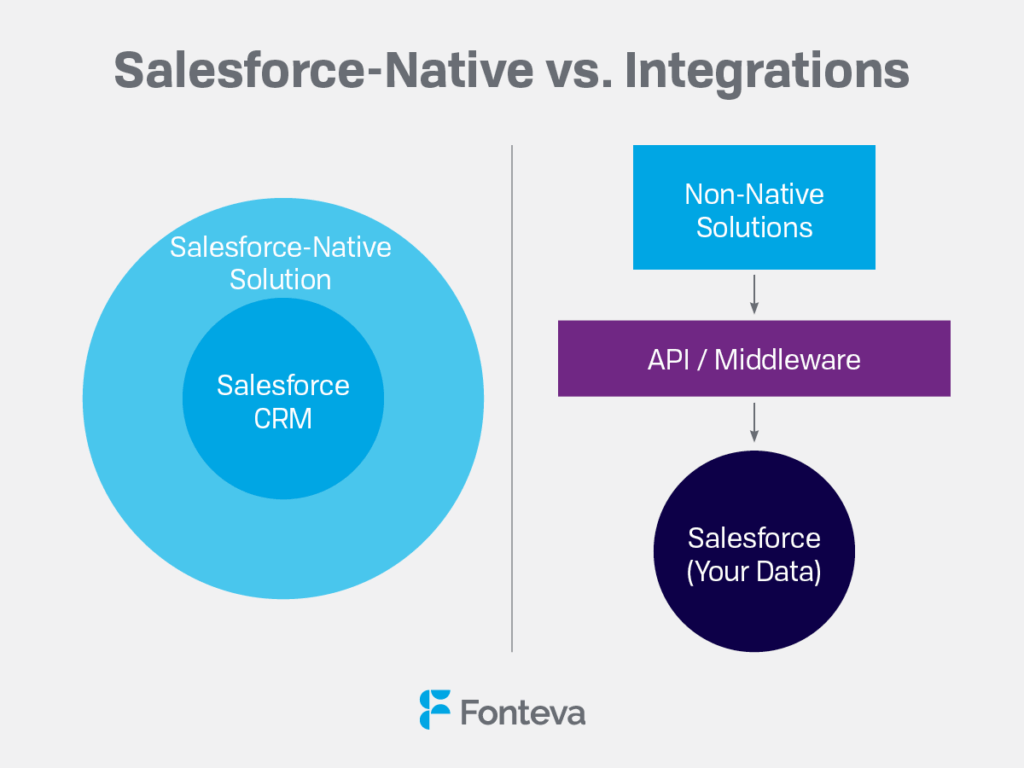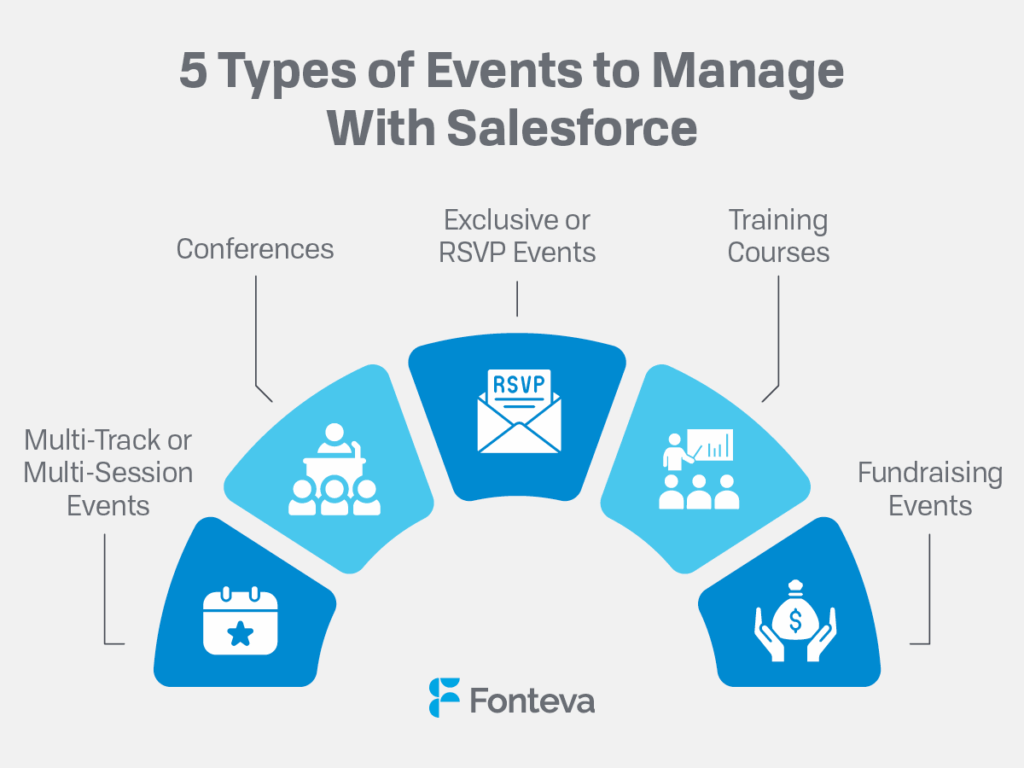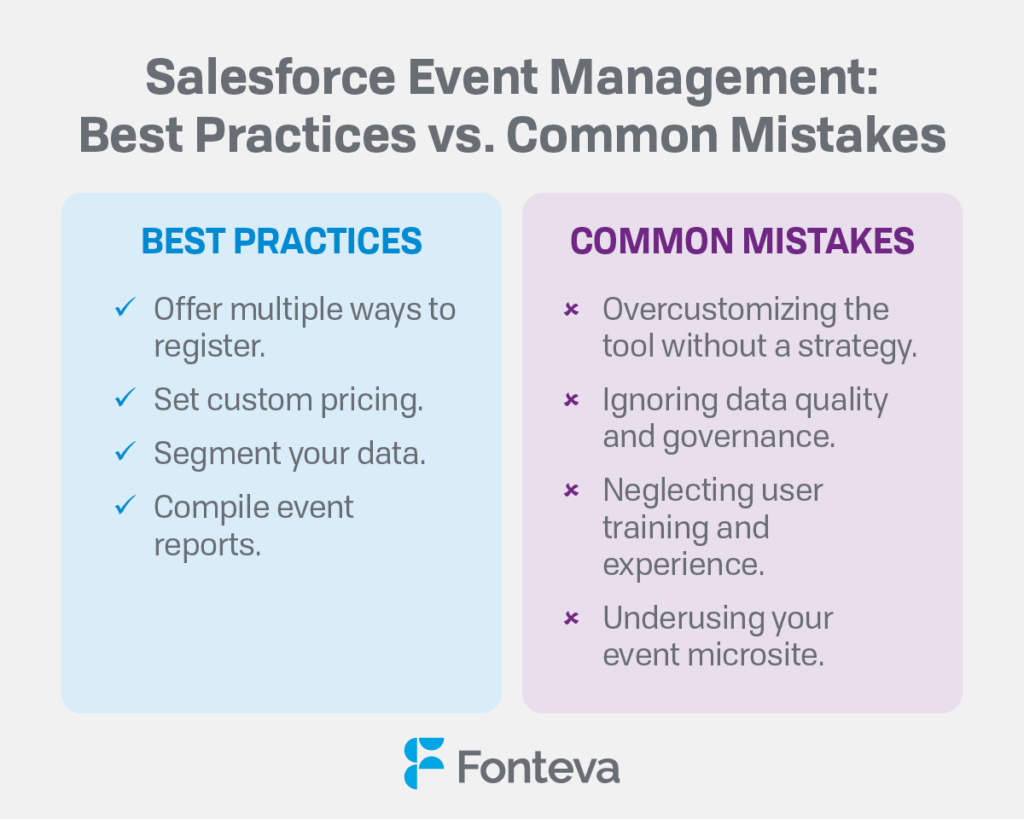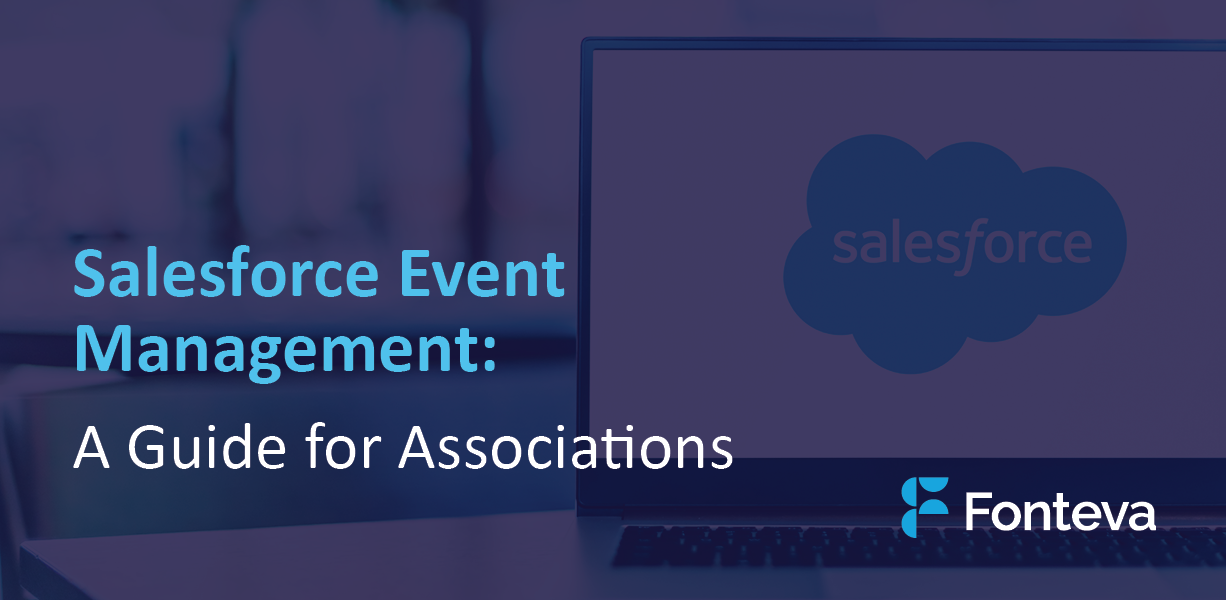The 2025 Membership Marketing Benchmarking Report cited events as one of the most commonly used member recruitment tactics. However, it also predicted that with the wealth of online resources available to members, in-person convention attendance is likely to decrease in the coming years. This underscores the pressing need to offer unique value that can’t be replicated online while providing seamless, personalized event experiences.
As a Salesforce user, your association management database is a hub for all of your daily activities, from tracking member data to running reports to managing communications. But did you know that Salesforce can also be used to plan successful, engaging events?
With the right software—and a bit of strategy—you can plan awe-inspiring events without ever leaving your Salesforce CRM. Let’s get started by answering a few common questions about Salesforce event management.

Salesforce Event Software FAQ
Does Salesforce have an event module?
While Salesforce does offer event management capabilities, they aren’t packaged in a unified “event module.” For example, Salesforce provides a calendar view that enables users to schedule events and a dedicated Event object for tracking those activities.
To get a comprehensive event management tool, look for a Salesforce-native solution designed with associations in mind. Fonteva Events, which is included in Fonteva’s association management platform, is native to Salesforce, allows you to manage events in any format, offers a tailored mobile app, and more. It’s created for associations, meaning you won’t need to implement clunky workarounds or integrations.
What are the benefits of using Salesforce for events?
Some of the key benefits of using Salesforce to manage your association’s events include:
- Centralized workflows. An event management system within Salesforce allows you to access all relevant data in one centralized location. Get a seamless, comprehensive event planning experience by managing all event-related tasks without leaving Salesforce.
- Powerful communication and automation. Add a personal touch to communications with attendees without placing any extra burden on your team. Salesforce allows you to set up automated workflows and communications. For instance, you might build an email stream that triggers when members register and automatically sends them a confirmation email, helpful pre-event information, and an event reminder.
- Robust reporting. Easily track key event metrics like registrations, attendance, revenue, attendee engagement, and event marketing campaign performance using reports and dashboards that make visualizing data simple.
- Scalability and flexibility. Host niche webinars for small groups and conferences with thousands of attendees, all from Salesforce. The platform can scale alongside your event without sacrificing performance or attendee experience. Salesforce is also highly customizable, meaning you can tailor workflows, pricing, and more to meet staff and audience needs.
Additionally, you’ll be able to leverage everything the Salesforce CRM has to offer. The platform offers regular updates, frequent new offerings, enterprise-level security practices, and more. This means you’ll have access to the same tools and protections Salesforce’s largest clients enjoy.
What’s the difference between a Salesforce-native and an integrated solution?
When choosing your Salesforce event management tool, look for software that will work seamlessly within your CRM. In other words, use a Salesforce-native app. Here are the key differences between native technologies and integrated tools:

- Salesforce-native solutions are built 100% on Salesforce without external code or databases, typically using Apex, Lightning Web Components, etc. These platforms allow for seamless data transfer, ensure your data is up-to-date, and do not require any manual data entry.
- Integrated solutions are built outside of Salesforce and hosted independently. These platforms connect to Salesforce via APIs or middleware (software that functions as an intermediary between your database and external systems). Integrated tools require middleware setup and manual data syncing. They also often involve a separate login experience.
Integrated solutions tend to take longer to set up, require more time and effort to maintain, and can fragment your data across multiple solutions. It can also be difficult to scale up, as integrated solutions may not offer the same level of customization that Salesforce does.
How does event management work in Salesforce?
As mentioned, there are a few different ways to leverage Salesforce for event management. We’ll focus on helping you visualize how a native solution like Fonteva would function.
These solutions typically feature event builders where you can customize the basic fields of the event plan outline like the name of the event, date, location, speakers, etc. You can also create event microsites to host more event details. From there, you can promote the event, accept payments, track registrations, communicate with registered attendees, and analyze your event’s performance.
5 Types of Events Associations Can Manage With Salesforce
Innovation is more important than ever in the association event space. Offering events of various sizes and formats ensures you’re offering fresh, new experiences that keep members engaged. Using Salesforce, you can organize several types of events, such as:

- Multi-track or multi-session events: If your event offers multiple tracks or sessions, you can use your Salesforce event management app to ensure that guests can easily register for the exact activities they want. For example, if you’re offering multi-session professional development courses, your app can enable students to register for all events within the series at one time.
- Conferences: Conferences give members the opportunity to come together, learn new things, and have enriching experiences. Consider choosing a platform with a custom event app you can use to schedule speakers, vendors, and exhibitors. Then, allow guests to manage their own schedules depending on which tracks or sessions appeal to them.
- Exclusive or RSVP events: If your event has a set guest list, your event management software can automate the process. Use your Salesforce CRM and event tools to segment your database and send out invitations to specific individuals or create a designated guest list. Then, record your RSVPs within your database.
- Training courses: These events help members increase their knowledge, stay up-to-date with industry trends, and upskill. For example, a professional marketing association might teach members how to train ChatGPT to use their brand’s voice and speak to specific target audiences, streamlining content creation. Attendees can choose to sign up for a one-time session, selected events, or an entire series.
- Fundraising events: Fundraising events are an engaging and profitable way to raise additional revenue for your association or to support a nonprofit or other organization relevant to your industry. With your Salesforce CRM, you’ll automatically have access to all the data you need to plan an event that appeals to supporters.
How to Choose the Right Salesforce Event Management App
There are many event management and planning apps on the Salesforce AppExchange, and the options can be overwhelming. To make sure you select one that meets your needs and helps your association reach its goals, keep these factors in mind:
- Pricing: Ensure the event management platform fits within your organization’s budget. Keep additional costs like payment processing fees, training expenses, and other service fees in mind.
- Native Salesforce application: The only surefire way to guarantee compatibility is to find an event management app that’s native to Salesforce. As mentioned, this ensures your software is always synced with an accurate, up-to-date, and complete data set.
- Cloud-based functionality: Cloud-based platforms don’t require any hardware; all you need is a WiFi connection to get your event management solution up and running. Other advantages of a cloud-based solution include multi-user capabilities, easy event day access, and unlimited growth potential.
- Mobile optimization: Check that the software creates mobile-friendly registration forms, event sites, and more. Guests should be able to retrieve any necessary event information through their smartphones, giving them hands-on access to your event at any time. For added convenience, offer a mobile event app to your guests.
- Flexible guest management tools: Attendees are at the center of your event. Event management tools can help you prioritize attendee engagement and maximize guest participation. For example, look for platforms with features that allow guests to create their schedules and help your staff map out table and seating arrangements.
- Custom registration options: You may need custom registration for multi-day events, event series (like courses or classes), or multi-track events with more than one series to choose from.
- Event website generator: A dedicated event microsite should serve as the center of all things event-related. With a well-designed site, your guests will have a one-stop shop for everything regarding your event. Use this site to register attendees, display merchandise, recognize sponsors, and share event details.
Opting for a solution with these features will ensure you have a well-rounded event planning toolkit. Fonteva’s association management platform is Salesforce-native, offers all of the event management tools listed above, and includes the features you need to manage your association’s daily operations. To learn more about Fonteva and discover if it’s the right platform for you, reach out for a demo today.

Salesforce Event Management Best Practices
Even after you’ve selected and implemented an event planning tool, your work isn’t done. You’ll need to make sure you’re getting the most out of your investment by following best practices like these:

- Offer multiple ways to register. When you choose an event app with custom registration tools, you can make the registration process more flexible. For example, offer group registration for companies and allow attendees to register online or at the door.
- Set custom pricing. Custom pricing gives attendees more control over their event experiences. For example, set general admission and VIP prices to give members access to different perks and opportunities. Consider offering exclusive deals to members or creating personalized prices or discounts based on members’ history with your association (e.g., those who have been members for five or more years get 20% off).
- Segment your data. Segment your supporter data using custom fields, and leverage this information to design events with your attendees in mind. For example, set registrations at just the right price, invite past attendees, and send targeted communications that appeal to their interests.
- Compile event reports. Use reporting tools to objectively assess your success, improve your event-planning skills for the future, and create more compelling events. Track metrics like registrations, attendance rate, return on investment, and attendee engagement.
Taking these steps will make the event planning process easier for your staff and provide positive, personalized experiences to attendees. This will help you recruit new members and motivate attendees to join your events.
4 Common Mistakes to Avoid
While we’re discussing best practices, let’s quickly touch on common mistakes to avoid. Steering clear of the following missteps will save your association time and money. When event planning with Salesforce, avoid:
- Overcustomizing the tool without a strategy, as this can lead to technical debt, clutter, slow performance, and costly maintenance.
- Ignoring data quality and governance, which can result in duplicate records, reporting errors, and other issues. Essentially, you’ll have inaccurate data and, therefore, incomplete insights.
- Neglecting user training and experience. While you might be eager to charge ahead, remember to spend time getting staff up to speed so they feel confident with the tools.
- Underusing your event microsite. Treat this as an engagement tool rather than just a basic landing page.
Additionally, don’t underestimate the importance of data security standards. The last thing you want is to put your attendees’ sensitive information at risk. Make sure your team knows how to set up strong passwords and use multi-factor authentication. Most importantly, choose software that prioritizes security.
Additional Resources
The perfectly planned event might be an abstract concept, but with a little help from the right event management software (not to mention your Salesforce data!), your organization will soon be one step closer to event success and happy attendees.
For more help streamlining association management, check out these additional resources:
- Harnessing AI for Associations: Tools & Trends to Watch. Your association can use Salesforce for more than just event planning. Learn about leveraging the AI tools Salesforce has to offer to enhance association management.
- Top 20+ Association Management Software (AMS) Picks for 2025. Explore the basics of association management software and browse our top recommendations.
- 15+ Association Member Engagement Ideas for Better Retention. Struggling to get members involved? See how you can use your technology to inspire active participation.

